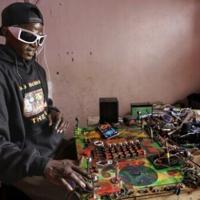A spoon, a towel rack, a kettle and a plastic cap – with DJ Bobos’ technical and musical skills, that’s all you need to build a mixing deck.
The 27-year-old, whose real name is Paul Mwangi, has built a fan base online and on the streets of Kenya with the unique decks he builds.
This earned him a spot at Uganda’s Nyege Nyege Festival, the largest in East Africa, as well as a spot on the world-famous club website Boiler Room.
But his favorite venue is Nairobi’s bustling business district, and on a recent Saturday he wandered the venue amidst the milaa (cart) stalls, the smell of roasted corn and the corners of Matus, colorful minibuses in the Kenyan capital. I readied myself.
Within minutes, dozens of curious onlookers had gathered, whipping out their phones to take pictures of the amazing machine spitting out reggae hits.
The mixing desk consists of a spray-painted wooden plank with a screwed-on towel rack, switches, and printed circuits connected by a tangle of cables, all connected to an amplifier, speakers, and car battery. has been.
He scratches with a slider made from a magnetized spoon held between two towel hooks, and the faders are made from plastic bottle caps cobbled together.
Modifications are made without interrupting the flow. At one point, DJ Boboss takes out a screwdriver, strips the wire with his teeth, and repairs the fault while music plays.
– “Make it yourself” –
“I’ve never seen anything like this in the world,” said smiling David Meshak, who works at a nearby electronics store that sells professional turntables.
“One day a customer came in with the photo. He wanted the same thing, but he didn’t know what it was,” he said. “I saw it today!”
Bobos is an acronym for “Be your own boss,” and Mwangi started his career repairing radios.
“My father bought me a radio. After a while the radio stopped playing and I said I wasn’t going to buy it anymore. I was so addicted to music and the radio that I was stressed out, so I went with a knife. “I turned on the radio,” he said.
Soon he was repairing electronic equipment in a village near Meru in central Kenya.
One day, he saw a DJ at a bar and was inspired.
“I loved the way he played his music and the audience reaction. I didn’t have the money to buy real equipment, but I said I could make it myself using the resources available.”
Mwangi moved to the capital and now makes a living from DJing and occasionally selling specially commissioned turntables.
His favorite places are the streets, especially the business district and Gikomba, the country’s largest used clothing market.
“Street shows have a special feeling and connect with people. Many people have never seen a DJ mix live,” he said.
Among the onlookers, Zachary Mibey, a 48-year-old retired soldier, said he loved the way Mwangi explained the situation of young people in Kenya.
“He has no training. It’s all homemade. He shows that he has something inside him. He’s telling us, ‘I can do it myself,'” Mibey said. spoke.
Bobos admits the time has come for a more advanced turntable, perhaps with some additional features, but he has no intention of letting go of the turntable that made him famous.
“Let’s combine both and see what we can do,” he smiled.
sva/md/er/rbu/yad

